From BYD to Xpeng, Chinese manufacturers are zealously bidding to fast-track global brand recognition as they seek to boost profits in markets far more lucrative than their own.
Strategies range from the thoughtful to the hurried, underpinned by varying degrees of marketing budget, desperation and forward planning.
The latest to enter the UK has a unique approach to its globalisation aspirations: Changan has been preparing for this moment for almost two decades, ever since it opened a design centre in Turin, Italy, in 2006, and a research and development facility in the UK 15 years ago.
This is no knee-jerk reaction to counter worryingly low profits in the insanely competitive Chinese market; Changan has long been augmenting its manufacturing capabilities with the engineering and design knowledge of western experts as meticulous groundwork for its eventual incursion into Europe.
Neither is Changan a recent start-up like many of its compatriots. Its roots can be traced way back to 1862 as a military industrial company in China – its first chief executive was, ironically, a Scotsman! – and it became the one of the first local producers to start making cars more than 40 years ago.
However, its measured approach to global expansion masks a strong appetite for accelerated growth now its strategy is in play.
Last year, Changan sold 2.7 million cars globally, 85% via its own trio of brands – Changan, Deepal and Avatr – and 15% through long-established joint ventures with Ford and Mazda. The target this year is three million, which would consolidate its position as the world's 11th largest OEM by sales (ahead of the likes of BMW, Mercedes-Benz and Renault).
In September, it will launch its first car to the UK, the Deepal SO7, a mid-size electric SUV.
“Changan has had a strategy to be global since the early 2000s, but at the right pace,” said UK managing director Nic Thomas (pictured below), who was appointed 18 months ago.

Set up for success
Speaking exclusively to Fleet News at Changan’s capacious R&D centre in Birmingham, housing more than 100 engineers, the former Nissan marketing director has been occupied setting up the infrastructure necessary for a successful long-term business.
This includes parts warehouse and training centre, as well as carrying out market testing and behind-the-scenes work with insurance-funded safety and repair research body Thatcham.
Thomas has also been building his senior team which includes recent recruits Richard Chamberlain as head of fleet and Grant Richards as sales director. Both men bring abundant experience from working in senior positions at other manufacturers.
A dealer network is also coming together to support the sales and aftersales needs of fleet and retail customers. Appointments are imminent, as the first boatload of right-hand drive cars land in the UK this month.
“Our 2030 goals are to have 1.2 million overseas sales, with more than $10bn investment in factories,” Thomas said. That’s double the 600,000 cars sold outside of China last year.
Top 10 by 2030 in the UK
In the UK, it wants to be top 10 by 2030, an aspiration that would see it exceed 100,000 units and a 5% share of the market.
While Changan is the parent brand, and the name that will adorn the showrooms, Deepal is the launch marque with the SO7.
This sub-£40,000 full electric SUV (4.75 metres in length) epitomises the upper mainstream, yet affordable family car positioning of Deepal, which leans heavily towards sporty styling and high tech.
It promises WLTP range of 295 miles from an 80kWh battery, which is “accurate in summer, with only a 10-15% loss in winter”, according to Thomas, who has been running one for much of the past year.
Unusually, the SO7 will be offered in just one fully loaded trim, with five exterior colours and three interior colours. The only other decision for drivers to make is whether to choose 20-inch or 19-inch alloys and optional towbar.
“We want to make it simple for everyone – the customer, the dealer, stocking, leasing companies and CAP,” said Richards (pictured below).

The compact SO5 SUV (4.6 metres in length) will launch later this year, priced mid £30,000, as full electric and plug-in hybrid, with a mid-size SUV slated for 2026, also as BEV and PHEV.
The Changan badge will appear from 2026 on a range of affordable, family-friendly small and medium-sized SUVs, initially with PHEV and hybrid powertrain. BEV will follow. All will be priced below equivalent Deepal models, starting in the £20,000s.
Avatr will join the mix by the end of next year, focusing on high end saloon sports cars and luxury SUVs. It has its own design centre in Munich, Germany, part of the Changan European head office, set up two years ago.
“We will have a full range of BEV, PHEV and hybrid cars within two years, focusing on the B to D SUV segments,” said Thomas.
“We also have 80 products in development for the global market at our head office in Chongqing. There is the potential to add body styles in the future, including estate cars and small hatchbacks, as well as vans and pick-ups.”
Production planned for Europe
Reinforcing Changan’s global aspirations is the prospect of building a manufacturing plant in Europe.
“Our chairman Zhu announced at our March launch event that we are committed to building in Europe for Europe. That means we will continue to strengthen our European R&D and design teams, and that we are actively investigating local production options,” confirmed Thomas.
“We are committed to local production with local sourcing before 2030, in line with our ambitious strategy to be one of Europe’s and the world’s leading auto makers.”
Birmingham is the engineering centre of excellence for Europe, testing vehicles prior to launch and making any necessary changes.
“When the first cars came to the UK last year, the engineers were impressed by the quality but looked at the suspension and said it wasn’t right for this market,” Thomas said. “It took the company just three months to recalibrate it to be suitable for our roads. I’ve never seen that speed in a Western manufacturer.
“That’s the benefit of China speed: we can change software with over-the-air updates within a week or change the entire suspension within three months!”
Chinese manufacturers are already renowned for their ability to launch new models from scratch in as little as 18 months, compared to the five-to-seven years of conventional OEMs.
What’s their secret? “Resource and a different mindset – there’s a recognition that we need to do things at speed, but also with quality,” Thomas said.
This is embedded in the broader Chinese culture where consumers are constantly looking for latest technology, compelling companies to rapidly evolve and innovate.
But speed does not come at the cost of quality, Thomas stresses: “We are ranked No1 brand by JD Power for initial vehicle quality in China.”
Learning from others
Changan becomes the seventh Chinese home brand to enter the UK, charting a path trodden by GWM (Great Wall), BYD, Omodo/Jaecoo (Chery), Xpeng, Leapmotor and Skywell. Also imminent are Geely and Chery, which have both revealed plans to launch own-badge models.
“We have learned from the other brands that have already launched in the UK, and that will enable us to make a smoother entrance,” Thomas said.
This includes opening a full stocked parts warehouse (in the Netherlands in partnership with Kuehne & Nagel, with a UK subsidiary for fast-moving lines), agreeing terms with banking partners for wholesale and retail finance, establishing an experienced fleet team, consulting with Cap, introducing the car to leasing companies ahead of launch, working with Thatcham on SMR costs and insurance companies on ratings, setting up a dealer network with full training and technical repair manuals, and having bodyshops prepped for repair.
By year-end, Thomas expects to have signed up 60 dealers, with at least 45 fully operational. Within three years, he is targeting a network of 100 sites with a maximum of 25 partners.
“We expect to be a significant volume brand by 2027 in the UK and top 10 within five years with 5% market share,” he said.
To hit that significant marker requires 100,000 registrations which would see Changan overtake the likes of Hyundai, Peugeot, Renault and Vauxhall (based on their 2024 sales performance).
Fleet will be a crucial part of the mix with the bias towards full electric and PHEV, but Thomas expects to pick up sales from the retail market with the right pricing.
“Fleet will account for 40-50% of our sales, and a higher proportion of BEV through leasing and salary sacrifice,” Thomas said.
He added: “We have the back-up, the team, the products and the investment to do this.”
Design, quality and tech: pillars for success
Changan UK managing director Nic Thomas believes the key attributes appealing to today’s car buyers has shifted away from raw performance towards design, quality and technology.
And here, he believes, Changan has an edge thanks to the blend of contributions from its Chinese and European operations.
Exploiting the manufacturing advantages of its well-drilled facilities in China with the design and engineering know-how of its experts in Europe has resulted in a best of both worlds approach to model development.
“We lead on design; our products stand out,” Thomas said. “All our cars are connected, and our screens are incredibly reactive with no latency for navigation or functionality.”
He recognises that technology can be divisive and has heeded the growing clamour for the return of buttons.
“Our approach is to have buttons on the steering wheel and stalks. The screen is intuitive to use and angled towards the driver and a toolbar with all the key functions is always on display. It can also be configured for personal key functions as can the controls on the steering wheel.”
Changan also relies on intelligent voice control. Using the phrase ‘Hey Deepal’ for the SO7 model unlocks a full range of instructions, with the system able to determine who in the front two seats is talking.
Hence, the passenger asking for the window to be opened will have their window opened.
“I call it ‘designed for function’,” Thomas said.
Among the surprise and delight features on the SO7 are wireless charging with a cooling fan to prevent the phone battery from overheating, augmented reality head-up display, rear touchscreen for passengers to control the aircon and sun blinds, bird’s eye view cameras with additional side view to prevent kerbing alloys, hand gesture camera with selfie feature, and a camping mode which keeps the aircon on when the car is parked with external speakers to play music.
Changan has a joint venture partnership with battery maker CATL, which also is a co-owner of Avatr. They are also working on solid state batteries.






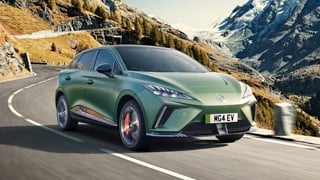
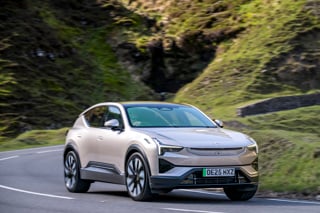
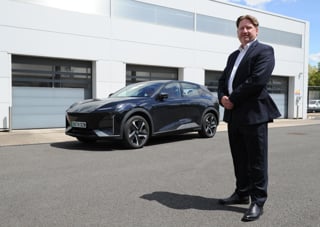
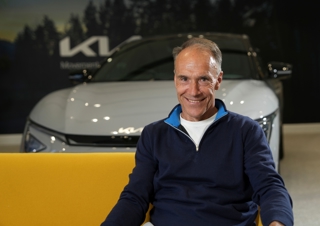
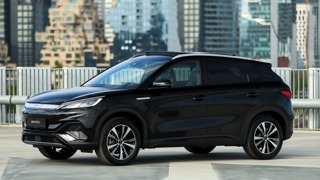












Login to comment
Comments
No comments have been made yet.